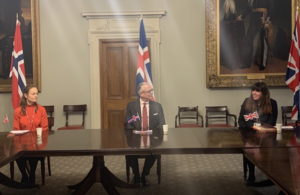United Kingdom, Norway and Iceland sign trade continuity agreement
An agreement to lock in trade in goods was signed in London today (Tuesday 8 December) between the UK and Iceland and Norway.

The agreement covers trade in goods, and ensures 95% of goods trade with Norway and over 90% with Iceland will remain tariff-free, providing businesses with certainty that they can continue to operate on the same terms as they do today when the transition period ends.
This agreement on goods is an interim agreement while the UK and EEA-EFTA countries complete negotiations for a comprehensive FTA to come into force in 2021.
UK trade with Iceland and Norway was worth £27 billion last year, with over £20 billion of this in goods.
The agreement ensures British firms will continue to see duty free access for all exports of industrial products. In addition, British consumers can continue to enjoy popular Icelandic and Norwegian products such as frozen haddock. Over 30% of the UK’s imports of fish fillets last year came from Iceland, many of which are used in British fish and chips shops.
Without this agreement, duties on UK imports from Iceland and Norway could have increased by an estimated £65 million[1] under World Trade Organisation trading arrangements.
International Trade Minister Ranil Jayawardena said:
Today’s agreement locks in tariff-free trade for businesses worth over £20 billion between our countries, supporting jobs and livelihoods across Britain and beyond.
I look forward to finalising a comprehensive trade agreement on goods and services with our longstanding partners Norway, Iceland and Liechtenstein to enter into force in 2021 that delivers on our shared commitment to free and fair trade.
In addition, the UK has also agreed a number of measures with the EEA EFTA states to ensure trade in services can continue as smoothly as possible ahead of a comprehensive trade agreement coming into force in 2021.
These measures include:
- Professionals who are resident or are frontier workers in the UK, Norway, Iceland or Liechtenstein, will continue to have their qualifications recognised. In the UK, they can also continue to apply for recognition for a short period after the Transition Period ends.
- The rights of EEA EFTA nationals/citizens in the UK and UK nationals in the EEA EFTA states will be protected.
- The UK has legislated so that personal data for general processing can flow freely from the UK to the EEA states after the end of the transition period.
- Businesses in Norway can continue employing UK nationals as directors.
- The UK is working with Norway and Iceland to conclude Air Service Agreements to provide for the legal basis for air services to continue between the UK and Norway/Iceland.
Steve Elliott, Chief Executive of the Chemical Industries Association said:
As the UK’s biggest manufacturing exporter, the successful conclusion of arrangements with important trading partners in the EEA/EFTA is good news. The chemical industry supports global tariff-free and fair trade and following the period of uncertainty caused by the Covid-19 pandemic our industry looks forward to contributing to the recovery of the UK economy.
Notes to editors
- This Agreement will now be subject to domestic procedures in the UK, Norway and Iceland.
- It is designed to be superseded by a comprehensive FTA between the UK and the EEA EFTA states in 2021 (Iceland, Norway and Liechtenstein).
- The UK and Norwegian governments signed a fisheries framework agreement in September 2020, which allows the UK and Norway to hold annual negotiations on the issues of access to waters and fishing quotas. More information on gov.uk.
- In November, the UK and Iceland signed a bilateral Memorandum of Understanding, providing for the establishment of a UK-Iceland Fisheries Dialogue to boost cooperation on fisheries matters between the two coastal States. More information on gov.uk.
- The Iceland-Norway-United Kingdom goods agreement, originally signed in April 2019, was designed to come into force in a scenario where the United Kingdom and the European Union did not come to a Withdrawal Agreement. This agreement therefore never came into force.
- To ensure continuity as far as possible at the end of the transition period, the UK, Iceland and Norway agreed to put in place arrangements on trade in goods originally agreed in 2019 to come into force on 1 January 2021. This required signing a new agreement.
- DIT calculations using tariff data from the European Commission and Eurostat trade data (accessed October 2020) for imports. Implied additional duties are calculated using the difference in MFN and preferential tariff rates (simple average tariffs at CN8 level) and the value of trade in 2019 for each product at CN8 level. Different approaches and data sources for this analysis are likely to yield different results. Calculations take into account inward/outward processing rules and trade which is eligible for relief under specific plurilateral agreements but not WTO or preferential quotas.